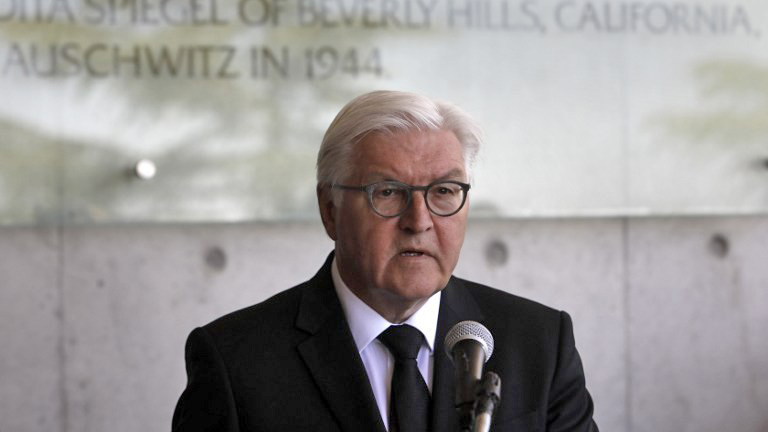Australia/Israel Review
Europa Europa: Mutual Mistrust
Jun 7, 2017 | Douglas Davis

Douglas Davis
The first lesson all new diplomats must learn is the dictum of 19th century British statesman Lord Palmerston: in matters of state, there is no such thing as permanent allies, only permanent interests. That remains almost universally true today. Almost.
One exception to the rule is to be found in the relationship between Germany and Israel. After the horror of the Holocaust and the creation of Israel, relations between the two nations would not, could not, ever be “normal”. Like it or not, Israel and Germany would be forever locked in a unique diplomatic embrace.
So, it was not altogether surprising that Frank-Walter Steinmeier, on his first visit to Israel as German president last month, should include a stop at Yad Vashem, the Holocaust remembrance centre in Jerusalem.
More surprising was that, in light of almost 70 years of history, Steinmeier felt the need to repeat that, “we Germans have burdened ourselves with unfathomable guilt.” Then he added: “As part of taking responsibility for what happened, we stand firmly alongside Israel and are working together for our common future.”
The event that moved the German President to reassert his country’s unique ties with Israel was a visit to the Jewish state by Germany’s Foreign Minister, Sigmar Gabriel, who precipitated a crisis by refusing an Israeli request to cancel meetings with two Israeli NGOs. Israel insisted that the NGOs – B’tselem and Breaking the Silence – unfairly tarnished Israel’s image and provided support for Israel’s critics, including the BDS community. When Gabriel ignored the request the German minister’s meeting with Prime Minister Benjamin Netanyahu was abruptly cancelled.
Another sign of the crisis came when German government spokesman Steffen Seibert announced a last-minute postponement of the annual joint meeting of the two countries’ cabinets, which had been scheduled to be held in Berlin last month [May]. The ostensible reason was the “many international meetings in the context of Germany’s G-20 presidency.”
Steinmeier, who did not schedule meetings with either of the offending groups, sought to smother the festering dispute. The unique German-Israeli ties were too important for such a squabble, he declared. “The foundations of the relationship are so broad that I think they can endure some turbulence like that which has [recently] taken place.”
Perhaps. But the row has exposed concern in Jerusalem that German solidarity with Israel is diminishing and that the Jewish state cannot continue to count on Germany as a permanent ally within the often-hostile European Union and the ever-vitriolic United Nations.
“Germany is a key country for Israel in Europe and the world,” said Avi Dichter, the former head of the Israeli Shin Bet domestic intelligence agency and chairman of the powerful parliamentary Foreign Affairs Committee. “Each reduction in German support for Israel is very worrying.”
Dichter’s comments followed a visit to Berlin in late March, when Gabriel told him it was increasingly difficult for the political elite to defend Israeli interests because the German population was critical of Israel. According to Dichter, “he expressed the fear that the younger generation won’t feel as much of an obligation towards the Jewish people.”
Chancellor Angela Merkel, who told the Knesset in 2008 that solidarity with Israel was integral to Germany’s raison d’état, is also now said to be chafing at the bit, not least because of what is seen in Germany as Israel’s construction of new settlements in the West Bank (just one has been announced since 1993), which threaten the prospect of a contiguous Palestinian state (Jewish settlements in the West Bank constitute 1.1 per cent of West Bank territory, according to senior Palestinian official Saeb Erekat).
More evidence of the rift appears to be Germany’s apparent lack of concern over security threats facing Israel, most importantly the gathering threat posed by Iran. Politicians in Jerusalem have the impression that the threat posed by Iran is being downplayed by the Germans.
“The degree to which the German leadership is being blinded by the Iran nuclear deal is astonishing,” said Dichter, who warned that Iran posed an existential threat both in nuclear and conventional terms.
That will not be the first time that the “new” Germany has acted duplicitously in its relations with Israel. Private German companies led the field in satisfying the military appetite of former Iraqi President Saddam Hussein before the first Gulf War, even as he openly threatened to “burn half of Israel.” When the extent of Germany’s military sales to Iraq was revealed, the German government “compensated” Israel with two modern submarines at substantial discounts.
Ironically, in the current heat of tension, Israel’s request to purchase three more submarines from ThyssenKrupp Marine Systems in Kiel has become controversial. The German government has been blocking the deal for months and questions from Jerusalem about progress have always been met by the answer that the time was not right. Now it has been agreed that the Federal Security Council, a nine-member body made up of Chancellor Angela Merkel and several ministers, will soon review the deal.
Hopefully, their response will not be clouded by revelations that German firms have been engaging in illicit arms sales to Iran – that German profits have not, once again, been bought at the expense of Israel’s national security.
Tags: Europe






